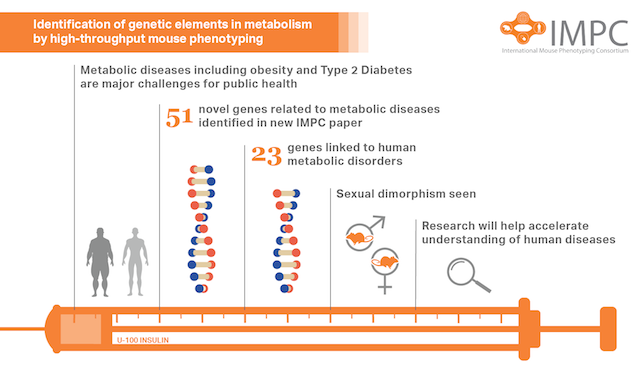New diabetes genes discovered in international mouse phenotyping study
Scientific cooperation has led to identify a network of genes that could play a vital role in the development of metabolic diseases such as diabetes. A research team from the Helmholtz Center Munich (HMGU) led the work that is published in Nature Communications – supported by partners in international scientific networks as IMPC and INFRAFRONTIER.

Diabetes is one of the fatal scourges of mankind today: According to the World Health Organization (WHO), about 440 million people worldwide suffer from diabetes worldwide – three times more than 1980 (108 million). In Europe, the fight against diabetes affects more than 60 million patients and causes costs of 145 billion Euros per year.
The development of metabolic diseases like diabetes is a complex process. As well as lifestyle and environmental factors, many different genes are responsible for the pathogenesis of both type 1 and type 2 diabetes. These genes encode information on how to assemble individual proteins that function in glucose metabolism.
Substantial progress in identifying new candidate genes
Many genes that play an important role in the development of human diseases like diabetes are still unknown. It is only by deciphering the causal genetic links that we can understand diseases, develop therapeutic interventions, or even prevent an outbreak. Thus, genes that are supposed to cause diabetes could be used as biomarkers for individual risk prediction, early diagnosis of the disease, or personalized approaches for treatment.
In the process of identifying these candidate genes´ for diabetes, Prof. Dr. Martin Hrabě de Angelis and his team of the German Mouse Clinic (GMC) in Munich have made an important step forward. As part of the International Mouse Phenotyping Consortium (IMPC) and the European Research Infrastructure INFRAFRONTIER, they examinedknockout mice´ – each lacking a specific gene – for metabolic dysfunction. Using this method, researchers are trying to establish whether the missing gene is involved in important metabolic processes and can be linked to human diseases.
23 genes might be important for diabetes in humans
“Our analysis of the phenotyping data has identified a total of 974 genes whose loss has strong effects on glucose and lipid metabolism,” said Hrabě de Angelis, who led the study. He is the head of the Institute of Experimental Genetics at the Munich Helmholtz Center, a member research center of IMPC. “For more than a third of the genes no connection to metabolism was known previously.”
The researchers that teamed up with first author Dr. Jan Rozman, who coordinates the metabolic phenotyping at the German Mouse Clinic, report that the functions of 51 of the discovered metabolic genes in the mouse were hitherto completely unknown. When compared with genome data collected in humans, they found that 23 genes appear to play a role in human diabetes. One of these genes is C4orf22, which appears to be involved in insulin action in participants of the diabetes study Tübingen Family Study (TÜF). This needs to be shown for the 51 new genes in the near future. “They are new candidate genes, and mice that lack these genes may be important models to investigate impaired glucose metabolism and diabetes,” explains Rozman.
Interestingly, according to the bioinformatician and co-author Dr. Thomas Werner, these genes were also similar in their structure: Many of them had common genetic elements. The scientists therefore assume that these genes belong to a network.In the future, they want to investigate these new regulatory structures and to explore to what extent they allow the prediction of gene functions of so-far unknown genes. Their research is based on the joint resources of INFRAFRONTIER, the pan-European Research Infrastructure for the generation, phenotyping, archiving and distribution of model mammalian genomes.
Original publication:
Rozman, J. et al. (2018): Identification of genetic elements in metabolism by high-throughput mouse phenotyping.
Nature Communications, DOI: 10.1038/s41467-017-01995-2